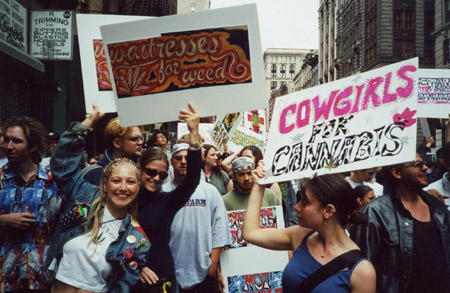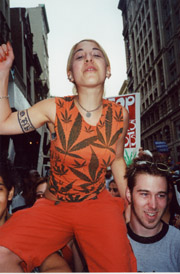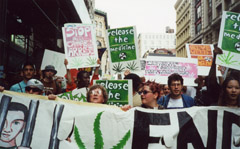|
Back to On the Road with John Tarleton NYC Police Whack Weed March; 193 Arrested
by John Tarleton NEW YORK CITY—Willie Duncan was arrested Saturday at the annual Million Marijuana March. His crime: trailing behind a trio of undercover cops yelling "Pig! Pig! Pig!". He spent the next five hours sitting on a sidewalk with his hands cuffed behind him before he was hauled downtown. He listened quietly, like a fly on the wall. "It was obvious from the way police interacted that they had collar quotas," said Duncan, 26, of New York City. "I heard them asking each other, 'How much did you get?' 'How much did you get?' or saying, 'I've got two.' 'I've got three.' 'I'm finished'."
CrackdownThe aggressive police response to the annual marijuana rally has come under heavy fire from protest organizers and participants as they sift through the debris of an event in which 193 people were arrested.
The day’s events began with a festive 1 p.m. march down Broadway by 3,000-4,000 people calling for the re-legalization of marijuana, which was criminalized in 1937. The cannabis sativa plant can be used to produce food, fuel and fiber. It provides relief to people going through chemotherapy and is also known for its recreational benefits. Chanting "we smoke pot and we like it a lot!", the crowd poured into Battery Park at the southern tip of Manhattan. There were sever! al stages and the crowd sat on the grass listening to music and speeches. The Statue of Liberty stood in the distance and dozens of undercover officers began moving through the crowd while hundreds of uniformed police ringed the perimeter. "I knew the moment I got there that a lot of people were going to get busted," said Geoffrey Campbell of Berkeley, California. Campbell, who began pointing out undercover police to crowd members, soon found himself being chased onto the stage where two more undercover police grabbed him. Campbell wiggled loose and dove into the crowd only to have people back away. The police pounced on him once more and dragged him away. "It was insane that they would dare to come on the stage in the middle of a First Amendment protected event," Bloom said. "That was disgraceful. It set the tone for the day." In spite of Campbell's spectacular arrest, crowd members continued blithely firing up joints only to find themselves being led away in handcuffs. "I think they knew they could get arrested," said Willie Duncan, 26, of New York. "But, they didn't care at least until they were arrested. And then they started crying." Officer Luis Cruz, a spokesman for the New York Police Department, said the police acted properly. "There were arrests by officers in uniforms and by officers in plainclothes," Cruz said. "We are not aware of any police acting in an overly aggressive manner."
"They Want to Move You Out Real Fucking Quick."127 of the 193 arrested were charged with various offenses including possession of marijuana and resisting arrest and 66 more were given tickets for "Obstructing a Government Agent" (OGA), according to Dana Beal of Cures Not Wars.
"I wanted to plead innocent and go to trial but the judge, prosecutor and the public pretender were all working in cahoots to give me ACD," Duncan said. "They want to move you out real fucking quick." Under the terms of ACD (Adjournment in Contemplation of Dismissal), defendants were released on unsupervised probation (ranging from 6-12 months) and their records will be expunged if they make it through the probationary period without any further arrests. However, anyone taking ACD is unable to sue the police for their a! ctions. "We needed a committee to coordinate legal response," Beal said.
Next YearCampbell, a veteran of various environmental and anti-globalization protests, suggested that protesters at next year's marijuana rally take a more pro-active approach to their own self-defense. He pointed out that demonstrators could tightly cluster themselves in a large circle, making it more difficult for police to enter their ranks, and then all light up at once. "Part of the plan is for a huge plume of smoke to hang over the crowd," Campbell said. "But, I didn't see that happening." Beal said that posters have already been printed for next year's rally and that he hopes to fill the park so tight that police can't even get in. Bloom said more police-protester dialogue might help, especially with a new mayor coming into office next year. "Giuliani is on his way out. This is his last year," Bloom said. "He hates drugs. He hates potheads. He's a DA with a vengeance." 312 people were arrested at last year's marijuana rally. From 1992-2000, annual marijuana arrests in New York jumped from 1,000 to 70,000 per year, according to Bloom. 10% of all marijuana busts in the US last year occurred in New York City. The four leading Democratic candidates for mayor have all promised to reduce the policing of people who possess small amounts of marijuana. Beal sees the light at the end of the tunnel. "We kept the struggle alive for the 8 years Giuliani was in power," Beal said. "We're like the guerrillas. We'll win because we'll still be there when the Army withdraws."
Million Marijuana March Back to On the Road with John Tarleton |

 "I have seen skirmishes before at pot rallies," said Steve Bloom, a senior editor of High Times who was pepper sprayed in the neck. "But, I've never seen anything as bad as what I saw on Saturday. It was absolutely appalling."
"I have seen skirmishes before at pot rallies," said Steve Bloom, a senior editor of High Times who was pepper sprayed in the neck. "But, I've never seen anything as bad as what I saw on Saturday. It was absolutely appalling."
 The lead legal liaison for Cures Not Wars had a family emergency on the following day, Beal said, and most of the arrested were represented by public defenders.
The lead legal liaison for Cures Not Wars had a family emergency on the following day, Beal said, and most of the arrested were represented by public defenders.